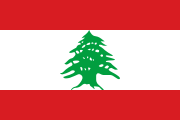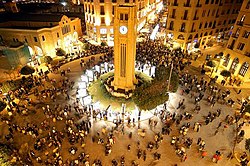Portal:Lebanon
The Lebanon PortalA view of Byblos, Lebanon
 Lebanon (/ˈlɛbənɒn, -nən/ ⓘ LEB-ə-non, -nən; Arabic: لُبْنَان, romanized: Lubnān, local pronunciation: [lɪbˈneːn]), officially the Republic of Lebanon, is a country in the Levant region of West Asia. It is bordered by Syria to the north and east, by Israel to the south, and by the Mediterranean Sea to the west; Cyprus lies a short distance away from the country's coastline. Lebanon's location at the crossroads of the Mediterranean Basin and the Arabian hinterlands has contributed to the country's rich history and shaped a unique cultural identity shaped by religious diversity. Lebanon has a population of more than five million people and covers an area of 10,452 square kilometres (4,036 sq mi). Lebanon's capital and largest city is Beirut, followed by Tripoli and Jounieh. While Arabic is the official language, French is also recognized in a formal capacity; Lebanese Arabic is the country's vernacular, though French and English play a relatively significant role in everyday life, with Modern Standard Arabic being limited to news and government matters. The earliest evidence of human civilization in Lebanon dates back to 5000 BCE. From 3200 to 539 BC, what was to become Lebanon was part of Phoenicia, a maritime empire that stretched the Mediterranean Basin. In 64 BC, the Roman Empire conquered the region, and Lebanon soon became a major center for Christianity under the aegis of the Byzantine Empire. In the 7th century, the Muslim conquest of the Levant brought the region under the control of the Rashidun Caliphate. The 11th century saw the beginning of the Crusades and the establishment of Crusader states, which later fell to the Ayyubids and the Mamluks, who in turn ceded the territory to the Ottoman Turks in the aftermath of the Ottoman–Mamluk War of 1516–1517. Under Ottoman ruler Abdulmejid I, the first Lebanese proto-state was established in the form of the Mount Lebanon Mutasarrifate, created in the 19th century as a home for Maronite Christians under the Ottoman "Tanzimat" period. Lebanon is a developing country, ranked 112th on the Human Development Index. It has been classified as an upper-middle-income state. The Lebanese liquidity crisis, coupled with nationwide corruption and recent disasters such as the 2020 Beirut explosion, have precipitated the collapse of Lebanon's currency and fomented political instability, widespread resource shortages, and high unemployment and poverty. The World Bank has defined Lebanon's economic crisis as one of the world's worst since the 19th century. Despite the country's small size, Lebanese culture is renowned both in the Arab world and globally, powered primarily by the Lebanese diaspora. Lebanon is a founding member of the United Nations and of the Arab League, and is a member of the Non-Aligned Movement, the Organization of Islamic Cooperation, the Organisation internationale de la Francophonie, and the Group of 77, among others. (Full article...) This is a Featured article, one of the best articles Wikipedia has to offer.
The law school of Berytus (also known as the law school of Beirut) was a center for the study of Roman law in classical antiquity located in Berytus (modern-day Beirut, Lebanon). It flourished under the patronage of the Roman emperors and functioned as the Roman Empire's preeminent center of jurisprudence until its destruction in AD 551. The law schools of the Roman Empire established organized repositories of imperial constitutions and institutionalized the study and practice of jurisprudence to relieve the busy imperial courts. The archiving of imperial constitutions facilitated the task of jurists in referring to legal precedents. The origins of the law school of Beirut are obscure, but probably it was under Augustus in the first century. The earliest written mention of the school dates to 238–239 AD, when its reputation had already been established. The school attracted young, affluent Roman citizens, and its professors made major contributions to the Codex of Justinian. The school achieved such wide recognition throughout the Empire that Beirut was known as the "Mother of Laws". Beirut was one of the few schools allowed to continue teaching jurisprudence when Byzantine emperor Justinian I shut down other provincial law schools. The course of study at Beirut lasted for five years and consisted in the revision and analysis of classical legal texts and imperial constitutions, in addition to case discussions. Justinian took a personal interest in the teaching process, charging the bishop of Beirut, the governor of Phoenicia Maritima and the teachers with discipline maintenance in the school. (Full article...)Did you know (auto-generated) -
TopicsRelated portalsReligions in Lebanon Arab states This is a Good article, an article that meets a core set of editorial standards.
The Armenian Revolutionary Federation (Armenian: Հայ Յեղափոխական Դաշնակցութիւն, romanized: Hay Heghapokhakan Dashnaktsutyun, abbr. ARF (ՀՅԴ) or ARF-D), also known as Dashnaktsutyun (Armenian: Դաշնակցություն, lit. "Federation"), is an Armenian nationalist and socialist political party founded in 1890 in Tiflis, Russian Empire by Christapor Mikaelian, Stepan Zorian, and Simon Zavarian. , the party operates in Armenia, Lebanon, Iran and in countries where the Armenian diaspora is present. The party was also active in Artsakh until the Azerbaijani offensive in September 2023. Although it has long been the most influential political party in the Armenian diaspora, it has a comparatively smaller proportional presence in modern-day Armenia. , the party was represented in two national parliaments, with ten seats in the National Assembly of Armenia and three seats in the Parliament of Lebanon as part of the March 8 Alliance. The ARF has traditionally advocated socialist democracy and has been a full member of the Socialist International since 2003; it joined the Second International in 1907. It has the largest membership of the political parties present in the Armenian diaspora, having established affiliates in more than 20 countries. Compared to other diasporan Armenian parties which tend to primarily focus on educational or humanitarian projects, the ARF is the most politically oriented of the organizations and traditionally has been one of the staunchest supporters of Armenian nationalism. The party campaigns for the recognition of the Armenian genocide and the right to reparations. It also advocates the establishment of United Armenia, partially based on the Treaty of Sèvres of 1920. The ARF originated as a merger of various Armenian political groups, mainly from the Russian Empire, with the declared goal of achieving "the political and economic freedom of Turkish Armenia" by means of armed rebellion. In the 1890s, the party sought to unify the various small groups in the Ottoman Empire that were advocating reform and defending Armenian villages from the massacres and banditry that were widespread in some of the Armenian-populated areas of the empire. ARF members formed groups of partisans (fedayi) that defended Armenian civilians through armed resistance. The party refrained from revolutionary activity in the Russian Empire until the decision of the Russian authorities to confiscate Armenian Church property in 1903. Initially restricting its demands to the establishment of autonomy and democratic rights for Armenians in the two empires, the party adopted an independent and united Armenia as part of its program in 1919. (Full article...)General imagesThe following are images from various Lebanon-related articles on Wikipedia.
CategoriesAssociated WikimediaThe following Wikimedia Foundation sister projects provide more on this subject:
SourcesDiscover Wikipedia using portals |























































